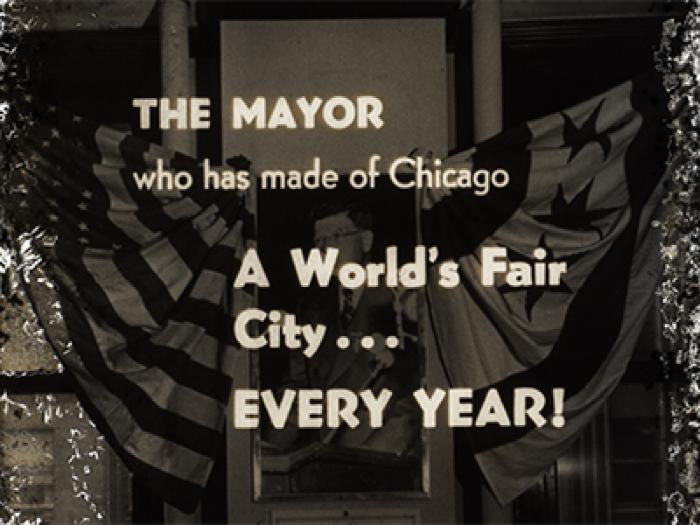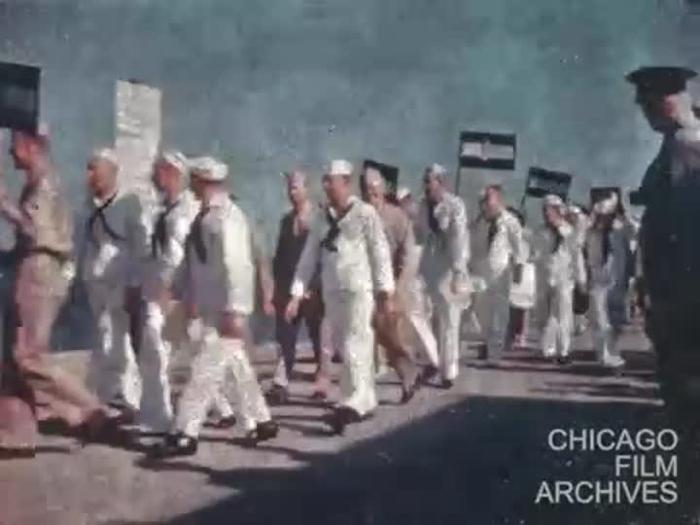Mayor Edward J. Kelly Collection
Inclusive Dates
1939 – 1944
Bulk Dates
1939 – 1944
Abstract
The Mayor Edward J. Kelly Collection consists of films collected by former Mayor of Chicago Edward J. Kelly (1933-1947) and found in his home in Eagle River, WI, after his death. Included within the films are fragments of newsreels depicting the construction of the State Street subway tunnel in 1939, the re-election of Kelly as mayor in 1939, the opening of a WWII service men's center in Chicago in 1942, and the unsuccessful presidential campaign of Thomas E. Dewey in 1944. The collection also includes a short campaign advertisement for Kelly's re-election in 1939.
Collection Items
Film
[Mayor Kelly Tours State Street Subway Construction]
circa 1938
Film
[Kelly Re-Election Campaign]
circa 1939
Film
Chicago Service Men's Center - Fragment
circa 1942
Film
[Mayor Kelly Signs Proclamation for 'Greatest Motion Picture Year']
1938
Film
G.I. Country Club
circa 1944
To request more information about the items in this collection, please contact the archive at
info@chicagofilmarchives.org.
Items with Viewable Media
- Chicago Opens 2nd Service Mens Center, also table hockey scene (comedy)
- Chicago Service Men's Center - Fragment
- [Dewey Campaign 1944]
- Edward J. Kelly
- G.I. Country Club
- Game of Checkers + Washington
- [Kelly Re-Election Campaign]
- [Mayor Kelly Signs Proclamation for 'Greatest Motion Picture Year']
- [Mayor Kelly Tours State Street Subway Construction]
- [untitled]
- [untitled]
- [untitled]
Collection Identifier
C.2018-10
Extent of Collection
10 reels of 35mm totaling approximately 1800 feet; 2 reels of 16mm totaling approximately 500 feet
Language Of Materials
English
Custodial History
The films in the Kelly Collection were previously stored in Kelly's former home in Eagle River, WI. After his death in 1950, the house and its contents were sold to the Murphy family of the Murphy Construction Company (now MCC, Inc.). The family moved the films to climate-controlled storage in the mid-1970s. In 2018, the Murphys sold the house and brought the films to CFA.
Access Restrictions
This collection is open to on-site access. Appointments must be made with Chicago Film Archives. Due to the fragile nature of the films, only video copies will be provided for on-site viewing.
Use Restrictions
CFA does not own copyrights to the films in this collection.




![[Mayor Kelly Tours State Street Subway Construction]](https://collections.chicagofilmarchives.org/media/cfa/images/4/1/54365_ca_object_representations_media_4193_large.jpg)
![[Kelly Re-Election Campaign]](https://collections.chicagofilmarchives.org/media/cfa/images/4/1/22582_ca_object_representations_media_4197_large.jpg)
![[Chicago Service Men's Center - Fragment] (circa 1942)](https://collections.chicagofilmarchives.org/media/cfa/images/4/1/20126_ca_object_representations_media_4192_large.jpg)
![[Mayor Kelly Signs Proclamation for 'Greatest Motion Picture Year']](https://collections.chicagofilmarchives.org/media/cfa/images/4/1/4507_ca_object_representations_media_4194_large.jpg)
